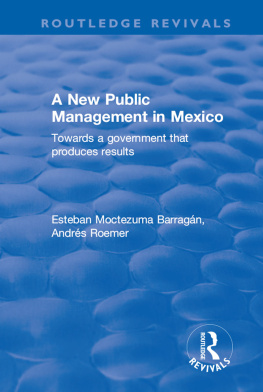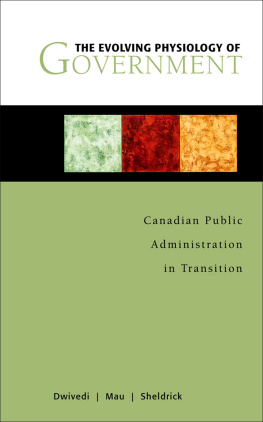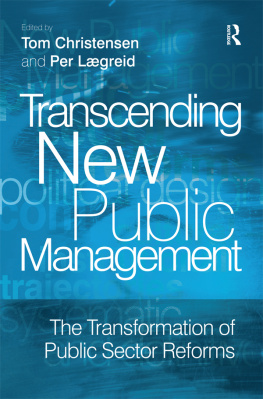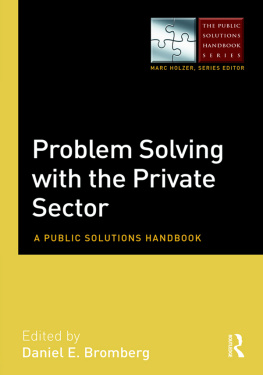First published 2001 by Ashgate Publishing
Reissued 2018 by Routledge
2 Park Square, Milton Park, Abingdon, Oxon OX14 4RN
711 Third Avenue, New York, NY 10017, USA
Routledge is an imprint of the Taylor & Francis Group, an informa business
Copyright Esteban Moctezuma Barragn and Andrs Roemer 2001
All rights reserved. No part of this book may be reprinted or reproduced or utilised in any form or by any electronic, mechanical, or other means, now known or hereafter invented, including photocopying and recording, or in any information storage or retrieval system, without permission in writing from the publishers.
Notice:
Product or corporate names may be trademarks or registered trademarks, and are used only for identification and explanation without intent to infringe.
Publishers Note
The publisher has gone to great lengths to ensure the quality of this reprint but points out that some imperfections in the original copies may be apparent.
Disclaimer
The publisher has made every effort to trace copyright holders and welcomes correspondence from those they have been unable to contact.
A Library of Congress record exists under LC control number: 2001094261
ISBN 13: 978-1-138-70121-2 (hbk)
ISBN 13: 978-1-315-21008-7 (ebk)
This book has a history forged of convictions about what a good government should be and, together with this, an efficient public administration. It began with my interest, as a senator, in contemplating, and working hard, in order to propose a bill for professionalizing and evaluating the performance of public servants in Mexico a law that would strengthen the development of human assets, that would generate institutional arrangements that were efficient with respect to objectives, indicators of performance, legal certainty, administrative transparency and, of course, of a responsible way of serving. Andrs Roemer joined this cause in order to fit the civil service into a model of result-oriented public administration. We worked together for nearly 21 months on theoretical and practical aspects, and evaluated evidence from national and international cases. Of course, the history and background of the topic played a relevant part in the study: political, institutional, situational, normative, demographic, territorial, sociological and cultural variables. However, fundamentally, what made this book possible was the invaluable, unconditional support from friends, colleagues, and national and foreign institutions concerned with a common cause: Mexico.
In spite of the impossibility of naming here all those who cooperated during this long process in investigating the problems of administrative efficiency, and in particular in regard to the aspect of institutions and their human resources, we are deeply grateful to all of them.
We especially owe our gratitude for their work, collaboration, reading, editing, comments and co-responsibility (sometimes coauthorship), to the following personalities in the field (in alphabetical order): Jorge Asali (legal analysis), Juan Manuel Caldern (theoretical introduction), Ana Leticia Cullar (institutional analysis), Enrique de la Madrid (administrative-institutional analysis), Jos Rafael Garca Cordova (appendices), David Garca Junco (national cases), Sergio Garca-Bull (institutional-administrative analysis), Hugo Alejandro Garduo Arredondo (translation and edition), Mara Eugenia Gmez Guerrero (editing), Fernando Gracia (international cases), Jos Octavio Lpez Presa (institutional-administrative analysis), Jos Luis Mndez (theory and national and international cases), Pablo Ojeda Crdenas (legal analysis), Gary Reid (institutional analysis), Everardo Rojas (edition), Aleida Ruiz (institutional analysis), Gabriela Saldate (appendices), Federico Seyde (theoretical analysis), Fanny Slomianski (final revision), Paul Slomianski (international cases), Edwin Villarreal (international cases), Carmen Zrate (writing, style and edition).
We are also grateful to our distinguished colleagues and friends: Luis Fernando Aguilar Villanueva, Manuel Arango, Eugene Bardach, Jos Luis Barros Horcasitas, Michael Barzelay, Javier Beristain, Federico Berrueto, Edgardo Buscaglia, Felipe Caldern, Bonnie Cohen, Robert Cooter, Miguel de la Madrid Hurtado, Manuel Herrera Rabago, Roberto Ducoing, John Ellwood, Carlos Elizondo, Arsenio Farell Cubillas, Arturo Fernndez, Bruno Ferrari, Jorge Ferrari, Roberto Garca Requena, Hugo Alejandro Garduo Arredondo, Jos Alberto Garibaldi Fernndez, Daphne Gonzlez, Claudio X. Gonzlez Guajardo, Natividad Gonzlez Pars, Guillermo Gemez Garca, Rony Heifetz, Luis Alberto Ibarra, Enrique V. Iglesias, Carlos Jarque, Kate Jenkins, Santiago Levy, Florencio Lpez de Silanes, Luis Maldonado Venegas, Luis Antonio Mrquez, Ral Mndez, Edgard Mercado, Adela Micha, Michael OHare, Pedro Ojeda Paullada, Adolfo Orive, Oscar Roemer, Jess Rojas, Alfonso Romo, Guillermo Ruiz de Teresa, Moiss Saba Masri, Libano Senz Ortiz, Octavio Salazar, Alejandro Saltiel, Jairo Snchez, Lucia Segovia, Boris Shwartzman, Fernando Sols Cmara, Francisco Surez Dvila, Javier Trevio Cant, Ernesto Zedillo Ponce de Len and, especially, Mnica Hurtado Padilla.
We also owe our appreciation to various academic and government institutions, as well as to international organizations that contributed in a vital way to the preparation of this work, in alphabetical order: the Bank of Mexico, Booz Allen and Hamilton of Mexico, the Center for Strategy and Development (CED, initials in Spanish), el Centro de Investigacin y Docencia Econmica (CIDE), the Department of Social Development of Mexico, the Department of the Comptrollership and Administrative Development of Mexico, the Department of External Affairs of Mexico, the embassies of Mexico to the following countries: Argentina, Bolivia, Chile, Colombia, Ecuador, Peru, Venezuela, France, New Zealand and the United Kingdom; the Graduate of Public Policy of the University of California at Berkeley, Grupo Pulsar Internacional, the Inter-American Development Bank, the John Fitzgerald Kennedy School of Government of Harvard University, the Latin American and Caribbean Law and Economics Association, the Mexican Senate of the Republic, the Mexican Academy of Law and Economy, the Mexican Society for Geography and Statistics and, especially, the National Water Commission; the National Geography and Statistics Institute, the Organization for Economic Cooperation and Development, the Office of the President of the Mexican Republic, the World Bank,










